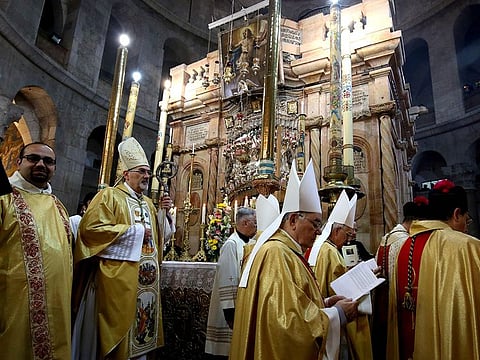Millions face Easter under COVID-19 curbs as US logs 100 million shots
Pandemic has claimed more than 2.8 million lives worldwide with no end in sight

Rome: Millions of Christians around the world prepared Saturday to spend another Easter weekend under restrictions because of coronavirus surges, but there was good news from the hard-hit United States, which crossed the milestone of 100 million vaccinations.
There have been worrying spikes in infections in many parts of the world, even as vaccine rollouts gather pace, forcing the reimposition of deeply unpopular restrictions including in European nations.
Italy began a strict Easter lockdown on Saturday, with the entire country considered a high-risk coronavirus “red zone” during a time when families usually hold reunions.
At the Vatican on Good Friday, a handful of onlookers caught a glimpse of Pope Francis presiding over the “Way of the Cross” ceremony in an empty St. Peter’s Square, with COVID-19 restrictions preventing large gatherings there for a second year in a row.
New restrictions also came into force Saturday in France, where authorities are scrambling to deal with a dramatic rise in cases that has overwhelmed hospitals in the capital Paris.
Curbs had been already intensified in other European nations such as Belgium, and Germany - where the government scrapped plans for a strict Easter lockdown - saw Chancellor Angela Merkel urge people to limit their social contacts ahead of the break.
“Doctors and nurses are doing everything they can,” Merkel said Thursday, warning that hospitals were filling up with younger people.
“We shouldn’t leave them alone, but instead support them through our own actions... That means it should be a quiet Easter celebration, in a small circle, with strongly reduced contacts.”
Across the Atlantic in Canada, similar restrictions were imposed ahead of Easter in Ontario and Quebec, the country’s two most populous provinces.
But there was a step towards normal in Jerusalem’s Old City, where a lockdown dampened Easter last year.
There was a modest crowd this year as most major sites opened thanks to Israel’s successful vaccine rollout.
“Last year, it was very hard. We felt like the city was dead,” said Lina Sleibi, a Palestinian Christian who sings at church services in the nearby West Bank holy city of Bethlehem.
Now, “you feel alive again”.
‘We need to finish this job’
The pandemic has claimed more than 2.8 million lives worldwide with no end in sight.
But the United States, the nation hardest-hit by Covid-19, became the first nation to administer at least one shot to more than 100 million people - around half of its adult population.
President Joe Biden has vowed to cover the vast majority within weeks.
But infections remain on the rise in parts of the country. Despite the success of the vaccine rollout, Biden urged Americans to keep wearing masks and taking other precautions.
“I plead with you. Don’t give back the progress we’ve all fought so hard to achieve,” he said in a brief address.
“We need to finish this job.”
The US Centres for Disease Control and Prevention has updated its guidance to say that fully vaccinated people can travel without observing quarantines, although they should still wear masks.
Crisis in Latin America
One of the worst COVID-19 outbreaks is devastating Brazil, which has reported more deaths than any country in the world after the United States.
It is the epicentre of an unfolding crisis in Latin America, where infections have soared past 25 million, likely fuelled by a seemingly more contagious variant first detected in Brazil.
The devastation in Brazil has frightened neighbours already battling their own surging caseloads.
Peru has gone into an Easter lockdown, Chile has closed all borders, Ecuador announced fresh restrictions and Bolivia sealed its border with Brazil.
Argentina’s President Alberto Fernandez announced late Friday that he had tested positive for the coronavirus. He had received the two-shot Sputnik V vaccine from Russia.
The president, who turned 62 on Friday, was in isolation as a precaution but said he was “physically well”.
“Although I would have liked to end my birthday without this news,” he said, “I am also in good spirits.”









